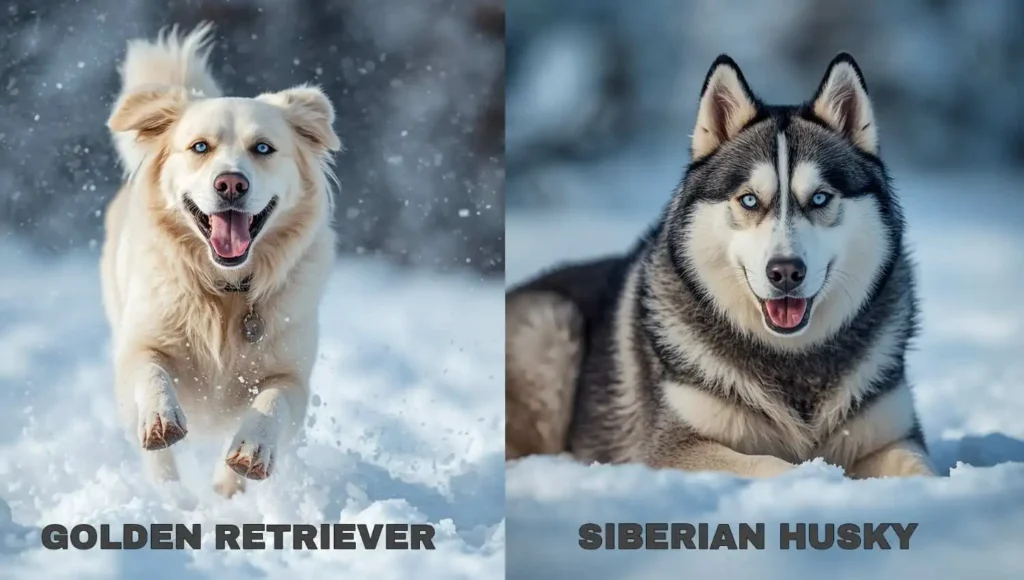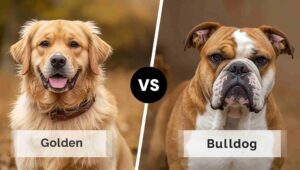Siberian Husky vs Golden Retriever: The Ultimate Breed Comparison

Introduction
Choosing between a Siberian Husky vs Golden Retriever represents one of the most common dilemmas faced by prospective dog owners. Both breeds offer unique characteristics that make them beloved family companions, yet they differ significantly in temperament, care requirements, and lifestyle compatibility. Understanding these differences is crucial when deciding which breed aligns best with your family’s needs and living situation.
Table of Contents
Physical Characteristics
Size and Build Comparison
When comparing Siberian Husky vs Golden Retriever in terms of physical attributes, notable differences emerge. Siberian Huskies typically weigh between 35-60 pounds, with males being larger than females. Their compact, athletic build reflects their sledding heritage. Golden Retrievers are generally heavier, weighing 55-75 pounds, with a more substantial frame designed for retrieving waterfowl.
Coat and Grooming Requirements
The Siberian Husky vs Golden Retriever grooming debate often influences owner decisions. Huskies possess a double coat that sheds extensively twice yearly during “blowout” seasons. Their coat requires regular brushing but is relatively low-maintenance otherwise. Golden Retrievers feature longer, water-repellent coats that require daily brushing to prevent matting and reduce shedding.
“The Siberian Husky’s coat is designed to withstand temperatures as low as -60°F, making them incredibly resilient in harsh climates.” – Arctic Breeds Association
Temperament and Personality Traits
Energy Levels and Exercise Needs
The Siberian Husky vs Golden Retriever energy comparison reveals significant differences. Huskies are high-energy dogs bred for endurance, requiring 2-3 hours of intense daily exercise. They excel at running, hiking, and sledding activities. Golden Retrievers, while active, have moderate exercise needs and are content with 1-2 hours of daily activity including walks, swimming, and fetch games.
Intelligence and Trainability
Both breeds rank highly in intelligence, but their Siberian Husky vs Golden Retriever trainability differs markedly. Golden Retrievers are eager to please and respond excellently to positive reinforcement training. They’re among the most obedient breeds and excel in obedience competitions. Huskies are intelligent but independent-minded, often described as “selectively obedient.” Their strong prey drive and escape artist tendencies require experienced handling.
“Golden Retrievers consistently rank among the top three most trainable dog breeds, while Huskies require patience and creativity in training approaches.” – Canine Behavior Institute
Family Compatibility
Interaction with Children
The Siberian Husky vs Golden Retriever family dynamic shows both breeds excel with children, albeit differently. Golden Retrievers are renowned for their gentle, patient nature with kids of all ages. They naturally moderate their energy around small children and rarely show aggression. Huskies are also good with children but require supervision due to their high energy and size. Their pack mentality makes them protective, but they may be too boisterous for very young children.
Socialization Requirements
Socialization needs in the Siberian Husky vs Golden Retriever comparison vary significantly. Golden Retrievers are naturally social and typically welcome strangers with enthusiasm. They adapt well to new situations and environments. Huskies can be more reserved with strangers and require extensive early socialization to prevent territorial behaviors. Both breeds generally do well with other dogs when properly socialized.
Living Environment Considerations
Space and Housing Requirements
The Siberian Husky vs Golden Retriever housing debate centers on space needs and climate tolerance. Huskies thrive in cooler climates and struggle in hot, humid conditions. They require secure fencing due to their escape tendencies and need substantial yard space for exercise. Golden Retrievers adapt better to various climates and living situations, though they also benefit from yard access.
Climate Adaptability
Climate considerations significantly impact the Siberian Husky vs Golden Retriever decision. Huskies are cold-weather specialists, comfortable in temperatures well below freezing but may overheat in warm climates. Golden Retrievers tolerate a broader temperature range, though their thick coats require management in extreme heat.
Health Considerations and Lifespan
Common Health Issues
The Siberian Husky vs Golden Retriever health comparison reveals breed-specific concerns. Huskies commonly face hip dysplasia, eye problems including cataracts and progressive retinal atrophy, and autoimmune conditions. Their average lifespan ranges from 12-15 years. Golden Retrievers are prone to hip and elbow dysplasia, heart conditions, and various cancers. Their lifespan typically ranges from 10-12 years.
Veterinary Care Costs
Healthcare costs in the Siberian Husky vs Golden Retriever comparison can vary based on breed-specific health issues. Golden Retrievers may face higher lifetime veterinary costs due to their predisposition to cancer and joint problems. Regular health screenings are essential for both breeds to catch potential issues early.
“Preventive care is crucial for both breeds, but Golden Retrievers require more frequent cancer screenings as they age.” – Veterinary Oncology Society
Training and Behavioral Differences
Obedience and Commands
Training approaches differ significantly in the Siberian Husky vs Golden Retriever comparison. Golden Retrievers excel in formal obedience training, consistently ranking high in golden retriever guides for training success. They respond well to repetition and positive reinforcement. Huskies require more creative training approaches, shorter sessions, and variety to maintain interest. Their independent nature means they may choose when to follow commands.
Problem Behaviors
The Siberian Husky vs Golden Retriever behavioral challenges present differently. Huskies may exhibit destructive behaviors when bored, excessive vocalization, and escape attempts. They’re notorious for their “singing” and howling. Golden Retrievers may develop separation anxiety, excessive shedding, and food guarding behaviors if not properly trained. Both breeds benefit from consistent, patient training approaches.
Exercise and Activity Requirements
Daily Exercise Needs
Exercise requirements represent a major factor in the Siberian Husky vs Golden Retriever decision. Huskies need intensive daily exercise including running, hiking, or sledding activities. They excel in activities like skijoring, bikejoring, and agility training. Mental stimulation through puzzle toys and training games is equally important.
Golden Retrievers enjoy moderate exercise including swimming, fetch games, and long walks. They’re excellent hiking companions but don’t require the intense exercise levels that Huskies demand. Their exercise needs can often be met through interactive play and training sessions.
Mental Stimulation
Both breeds require mental stimulation, but Siberian Husky vs Golden Retriever approaches differ. Huskies need varied, challenging activities to prevent boredom-related behaviors. They excel at problem-solving games and benefit from job-like activities. Golden Retrievers enjoy learning new tricks, participating in dog sports, and interactive training sessions. Their eagerness to please makes mental stimulation easier to provide.
Grooming and Maintenance
Daily Grooming Needs
The Siberian Husky vs Golden Retriever grooming comparison shows distinct differences. Huskies require brushing 2-3 times weekly, increasing to daily during shedding seasons. Their self-cleaning coats rarely require baths unless necessary. Professional grooming needs are minimal.
Golden Retrievers need daily brushing to prevent matting and manage shedding. Regular baths every 6-8 weeks help maintain coat health. Professional grooming every 6-8 weeks helps manage their longer coat and reduces household shedding.
Seasonal Care Requirements
Seasonal grooming in the Siberian Husky vs Golden Retriever comparison requires different approaches. Huskies “blow” their coats twice yearly, requiring intensive daily brushing for several weeks. Summer care involves ensuring adequate cooling and shade. Golden Retrievers shed consistently year-round with seasonal increases. Summer grooming may include coat trimming for comfort and cooling.
Cost Considerations
Initial Purchase and Setup Costs
The Siberian Husky vs Golden Retriever cost comparison begins with purchase prices. Both breeds typically cost $1,200-$3,000 from reputable breeders. Setup costs include secure fencing for Huskies (potentially higher due to escape prevention needs) and grooming supplies for Golden Retrievers.
Ongoing Expenses
Long-term costs in the Siberian Husky vs Golden Retriever comparison include food, healthcare, grooming, and exercise-related expenses. Huskies may require specialized equipment for cold-weather activities. Golden Retrievers may have higher grooming costs and potential cancer treatment expenses. Both breeds benefit from high-quality nutrition, with costs ranging $60-100 monthly for premium food.
Making the Right Choice
Lifestyle Assessment
Choosing between Siberian Husky vs Golden Retriever requires honest lifestyle assessment. Huskies suit active individuals or families who enjoy outdoor activities, live in cooler climates, and can provide extensive daily exercise. They’re ideal for experienced dog owners who appreciate independent, intelligent companions.
Golden Retrievers fit families seeking loyal, obedient companions who adapt well to various living situations. They’re excellent choices for first-time dog owners, families with young children, and those wanting a trainable, eager-to-please pet.
Long-term Commitment
The Siberian Husky vs Golden Retriever decision represents a 10-15 year commitment requiring careful consideration of changing life circumstances. Consider career demands, family changes, housing situations, and activity levels over time. Both breeds require consistent care, training, and attention throughout their lives.
“The right breed choice depends less on the dog’s characteristics and more on the owner’s ability to meet their specific needs consistently over their lifetime.” – American Kennel Club
For additional breed information, visit the American Kennel Club website.
Conclusion
The Siberian Husky vs Golden Retriever comparison reveals two exceptional breeds with distinct characteristics suited to different lifestyles. Golden Retrievers offer loyal, trainable companions perfect for families seeking gentle, adaptable pets. Siberian Huskies provide independent, energetic partners ideal for active individuals who appreciate their intelligence and endurance capabilities.
Success with either breed depends on matching their specific needs with your lifestyle, commitment level, and experience. Both breeds reward dedicated owners with years of companionship, though their care requirements and personalities differ significantly. Careful consideration of exercise needs, training requirements, grooming demands, and long-term health considerations will guide you toward the right choice.
Whether you choose the loyal Golden Retriever or the spirited Siberian Husky, both breeds offer unique rewards for families willing to meet their distinct needs. Have you determined which breed characteristics align best with your family’s lifestyle and long-term commitment capabilities?






